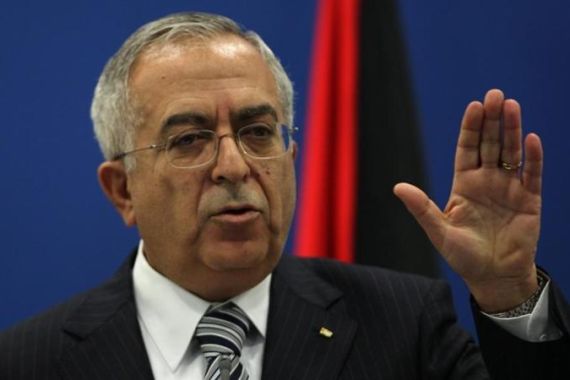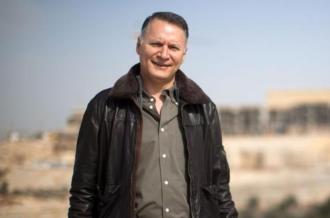Economic exploitation of Palestinians flourishes under occupation
Despite claims to the contrary, the Palestinian economy is drowning in exploitation and debt.

The Israeli-occupied West Bank has been rocked by protests over the past week. What is unusual is that the target has not been Israeli occupation forces, but the Palestinian Authority (PA).
In Ramallah, Hebron, Nablus and other cities, people took to the streets to protest rising prices, and the economic regime imposed by the Israeli occupation that is faithfully implemented by the Palestinian Authority.
Initially it seemed the mini-uprising was part of an internal power play amid a rising fiscal crisis where a drop in foreign aid means the PA is chronically unable to pay salaries of its 150,000 employees and unable to borrow any more from local banks and other creditors to which it owes some $2 billion.
PA President Mahmoud Abbas offered his support to the protests, calling them the beginning of a “Palestinian spring”, and YouTube videos showed demonstrators shouting for the resignation of Prime Minister Salam Fayyad and throwing shoes at images of him while studiously avoiding any attacks on Abbas.
Rivals for US and Israeli affections
Abbas appointed Fayyad as “caretaker” prime minister after the 2007 US-backed coup which overthrew the Hamas-led “national unity government”, as part of the Bush administration’s efforts to reverse Hamas’ 2006 election victory.
| Inside Story – Waiting for a ‘Palestinian Spring’? |
But since then Abbas and Fayyad have been forced to co-habit unhappily. Fayyad, a former International Monetary Fund (IMF) official whose party was badly defeated in the 2006 election, remains in post at the insistence of Israel, the United States and its European vassals – who fund the PA and oversee training of its repressive security apparatus.
Recent calls by Israeli Foreign Minister Avigdor Lieberman for Abbas to be replaced would undoubtedly have added to nervousness in Abbas’ entourage that the PA’s American and Israeli sponsors might try to oust Abbas and put Fayyad in his place. Abbas cannot have forgotten that the post of prime minister was created a decade ago specifically for Abbas so he could disempower and eventually replace Yasser Arafat.
This week it looked as though Abbas loyalists were making a move against Fayyad, perhaps in order to pressure international donors to rescue the financially insolvent PA or to signal that Abbas’ men, not Fayyad, hold sway on the ground.
But even if that were the case it would be a dangerous gamble. Other protests did turn against Abbas and the Palestinian Authority regime in general, and in Ramallah dozens of PA intelligence operatives shadowed demonstrators and harassed people in the streets whom they suspected of subversive intentions. If Abbas or his loyalists were behind any part of the protests, they risk unleashing a process they cannot control.
Against this background, both Abbas and Fayyad have been outbidding each other in their efforts to prove their loyalty and usefulness to the occupation regime and its US backers.
In May, Abbas complained to pro-Israel lobbyists visiting from the United States that Israel was preventing him from getting the weapons he needed to keep Palestinians in check.
“If they help me to get weapons, I’m helping them because I’m promoting security,” Abbas was quoted by The New York Times as saying of the Israelis, “We want security to stop terrorism. We have a need for these legal weapons. I have complaints from the security apparatus: ‘We don’t have guns and bullets’.”
“I cannot control the situation,” Abbas warned, “I am afraid, God forbid, that the security system here will collapse.”
As the unrest has grown, Israel has recognised the danger to the PA regime on which it depends, prompting Israeli Prime Minister Binyamin Netanyahu on Tuesday – no doubt on the advice of the Obama administration – to order the early transfer to the PA of $62 million in tax revenues Israel collects on its behalf.
The hoax of “Fayyadism”
Fayyad’s role by contrast has been less focused on direct repression and more on undermining Palestinians’ ability to resist Israel’s economic depradations.
Intense Western government and media propaganda has marketed the colourless Fayyad as a “reformer” and “visionary” leading and implementing a bold “state-building” plan to prepare Palestinians for independence.
In 2009, New York Times columnist Tom Friedman fired the starting pistol when he proclaimed that he’d discovered “the most exciting new idea in Arab governance ever” which he dubbed “Fayyadism”.
Phalanxes of western reporters flocked to Ramallah to report on the miracle. Germany’s Der Spiegel – typical of such reports – saw a Palestinian “tiger” economy in the making, its reporter impressed by the fact that “Ramallah now has a five-star hotel, sushi restaurants and parking metres” and that a “rotating, panoramic restaurant will soon open on the 28th floor of the Palestine Trade Tower, floating above Ramallah like a space ship”.
The manifestos of “Fayyadism” were the Palestinian Reform and Development Plan – effectively written by the IMF in 2007, and a shorter version of it, issued in August 2009 with the grand title “Ending the Occupation, Establishing the State” [PDF].
| Talk to Jazeera – Salam Fayyad |
Officials and pundits credited Fayyad’s “reforms” for rapid economic growth of 7 per cent in the West Bank. But it was all an illusion or, more accurately, a hoax. While economic growth in besieged Gaza was even faster – exceeding 20 per cent last year – that too was nothing to boast about. The West Bank and Gaza economies had shrunk drastically over the previous decade, and in Gaza, almost any activity, including reconstruction after the 2008 to 2009 Israeli attack and the effect of the tunnel trade with Egypt registered in the figures as spectacular “growth”.
Poverty and debt
As a recent World Bank report stated [PDF], virtually all the “growth” in the West Bank was the result of foreign aid and in the last few years, the PA “has become more donor dependent at an increasing rate”, with “the majority of the recent donor aid” allocated “to pay PA salaries and arrears, which has pumped up consumption and imports of consumer goods”.
The same World Bank report found that investment has been close to nil as the productive sectors of the Palestinian economy continued to shrink, with more people becoming dependent on PA salaries and aid handouts.
The illusion of prosperity for some has been fuelled by an explosion in debt. Consumer credit increased six-fold from $70 million in 2008 to $415 million in 2011 and car loans almost tripled from $40 million to $112 million, according to the Palestinian Monetary Authority.
Lending for residential construction – much of it speculative – more than doubled in the same period to over half a billion dollars.
It is this that allowed Netanyahu to boast before the US Congress last Spring that “the Palestinian economy is booming”. Palestinian cities, Netanyahu claimed, “look very different today than what they looked just few – a few years ago. They have shopping malls, movie theaters, restaurants, banks”.
This mirage fit well with his concept of “economic peace” where Palestinians’ rights could be bought off with a higher standard of living. And the intent was also to demonstrate to Palestinians in Gaza that if only they rose up and overthrew Hamas they too could see a better life.
But in fact, unemployment has continued to rise, and remains at Great Depression levels of 26 per cent (higher in Gaza), according to a new study by the UN agency UNCTAD, and, according to the World Health Organisation half of all infants under two in the West Bank and Gaza Strip suffer from iron deficiency anemia. Stunting and malnutrition levels have shown no signs of improvement as millions of Palestinians in the West Bank and Gaza Strip remain mired in poverty and food insecurity.
Economic exploitation built into Oslo Accords
Of course study after study, even by the World Bank, the IMF and other neoliberal institutions that legitimise and sponsor the PA, show that Israel’s grip on the occupied territories, its settler-colonial theft of land and water, and control of movement, remain the principal obstacles to Palestinian economic activity.
On top of this, the 1994 Paris Protocol, the economic counterpart of the 1993 Oslo Accord, gives Israel strict control over the Palestinian economy, including all imports and exports. Israel collects all customs duties on behalf of the PA and has repeatedly withheld them as a form of blackmail and punishment. The Paris Protocol established a system where virtually every basic commodity from soap powder to cement to gasoline must be imported from Israel or through Israeli middlemen – who in some cases are former officers of the occupation army.
Economic “development” has been channelled away from indigenous Palestinian business and into industrial zones where foreign and Israeli exporters can exploit unskilled Palestinian workers cheaply and without any accountability, a model enthusiastically financed and promoted by the United States, the European Union, Turkey and Japan.
Palestine’s new capitalists
A new class of Palestinian middlemen and capitalists close to and sometimes part of the Palestinian Authority, have flourished while the rest of the population has floundered.
 |
| Palestinian-American billionaire Bashar Masri is the developer of Rawabi, the first planned Palestinian city [GALLO/GETTY] |
While by no means the only one of his kind, Bashar Masri is perhaps among the most brazen. Masri, a Palestinian-American billionaire is the developer of Rawabi, a Qatari-financed luxury housing project near Ramallah that has been marketed as a “the first planned Palestinian city” and a “national project”.
Masri has invited Israeli firms to participate in this private, for profit development which is built on land confiscated by the PA from three Palestinian villages [AR], and partly subsidised by the US government.
In order to make overpriced Rawabi real-estate “affordable” to impoverished and debt-burdened Palestinians, the US government is financing and promoting US-style mortgages through Palestinian banks, importing the kind of lending practices that led to the foreclosure crisis in the United States.
Disregarding Palestinian civil society calls for boycott, divestment and sanctions, Masri has actively assisted Israeli firms to enter the Palestinian market, prompting the Boycott National Committee this week to issue an unprecendented condemnation of his “normalisation” activities which it characterised “as a means to advance personal interests and profit making at the expense of Palestinian rights”.
Economic liberation
Masri fits into a bigger picture, where holding companies like PADICO headed by billionaire Munib Masri, and the PA-owned Palestine Investment Fund, concentrate wealth and control of the Palestinian economy in the hands of a very few powerful men with no accountability whatsoever to the Palestinian people.
These men have been able to market their private interests as Palestine’s “national aspirations” with full support of the so-called “international community” even as they depend on maintaining cordial and profitable ties with the occupation they claim to oppose.
What this means – and perhaps what protestors in the streets of the West Bank are starting to recognise – is that the Palestinian liberation struggle will have to be directed not just at Israel’s racist colonial regime but also the global neoliberal economic system that has thoroughly penetrated Palestine and corrupted irreparably the idea of a “state” even before one is declared.
Ali Abunimah is author of One Country, A Bold Proposal to End the Israeli-Palestinian Impasse. He is a co-founder of the online publication The Electronic Intifada and a policy adviser with Al-Shabaka.
Follow on Twitter him at: @AliAbunimah
